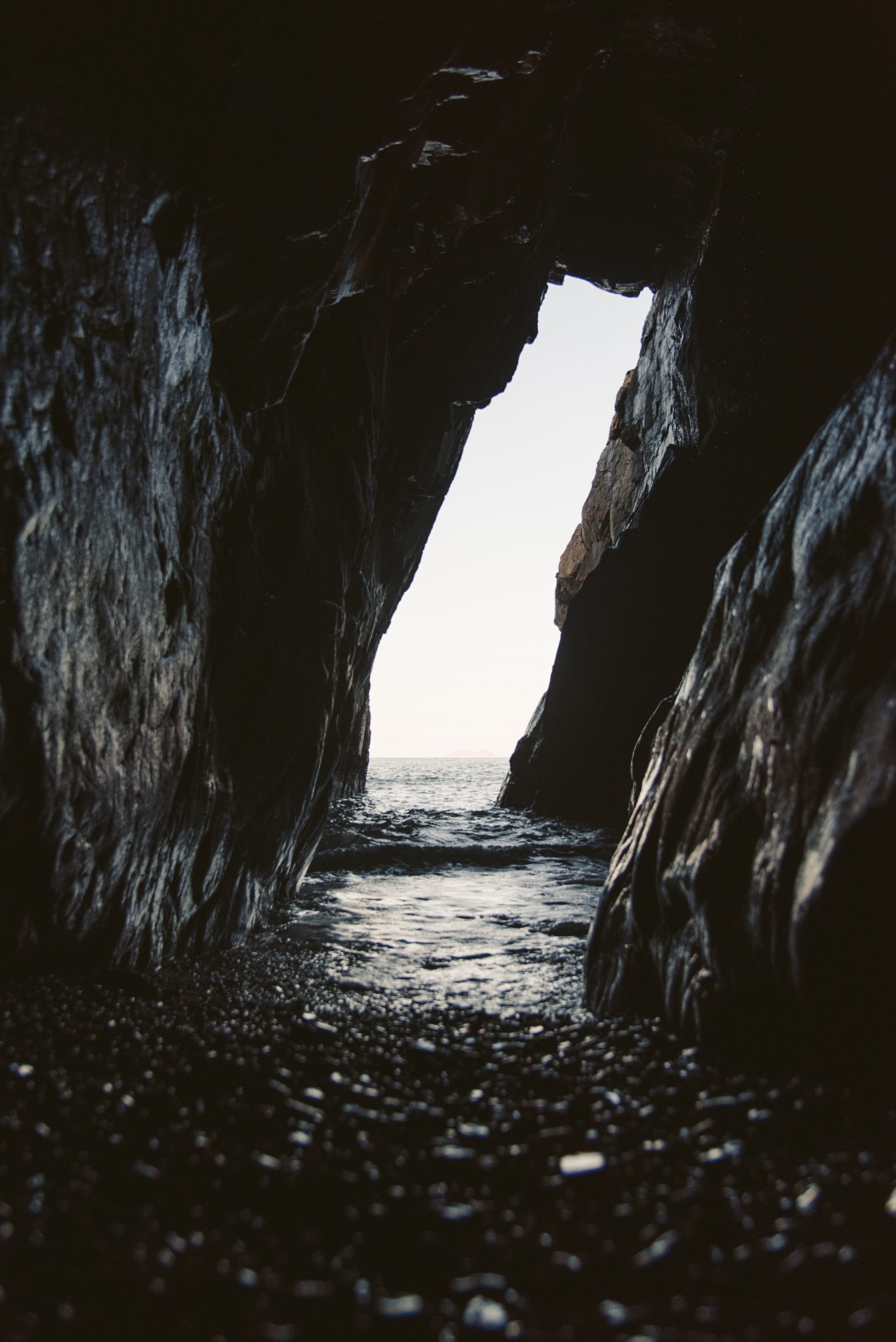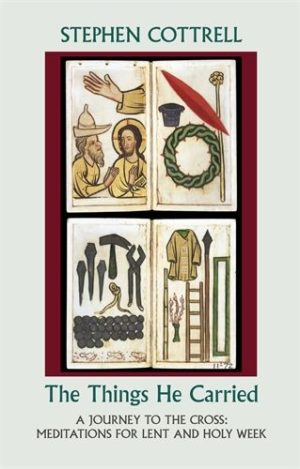



He carried a heart that was about to be broken.
That was how he eventually died. He carried his heart, open and vulnerable, from Jordan to Jerusalem, from Gethsemane to Golgotha. And then it was broken: broken by the savagery of the death he was about to face; broken by the sheer, uncompromising weight of all the other things he carried; but most of all, broken by the love that brought him to this moment of self-surrender.
Things slot into place. The halves of the cross are put together. Nailed down, weighed down, strung up – but also lifted up – boiled in the heat of the sun, shifting his weight from nailed wrists to nailed feet, facing the tortuous choice between suffocation and rending pain, the last hours of his life begin.
He looks again at his mother. She is just standing there, a sword of pain piercing her heart too. He sees the beloved apostle John and a few other women from his group. Everyone else has gone. There is a terrible loneliness in dying.
The hours pass. A strange overshadowing darkness creeps over the land. Suddenly there is a chill in the air. The noisy heckling of the crowd gives way to boredom and silence. One of the soldiers nods off. Some of the crowd start to drift away. The show is nearly over. Those who thought something spectacular might happen depart, disappointed, but not really surprised. There is business to be getting on with. The torturer’s horse scratches its innocent behind on a tree.
The agony is now at its worst. His temperature soars. His eyes swim. Disjointed, he heaves upward to gasp another breath. Everything is fading. Sweat peppers his body. Blood flows. He gasps with thirst. Rasping and raging.
I am thirsty…
Carrying so much, and the pain so great; and still the fear, also raging, still fermenting, nearly all-consuming, that he is actually carrying nothing, that it is all to no avail.
Who is it watching?
Who placed this thing here?
Who is waiting?
Why this cup in this moment?
Everything disjointed.
Stretching.
His body starting to fail.
Falter.
His ability to resist starting to fade.
Expiring.
No longer carrying the will to live.
Abandoned now.
The weariness from the beating.
It takes its toll.
It consumes you.
Now diminishing.
The barometer crashing.
The distant thunder rising.
Blood pressure falling.
Heart pounding.
Faster.
Faster.
The end in sight.
His lungs fill with fluid.
Gurgling, poisoning.
It is like he has taken a big breath in, but can never breathe out again.
He holds it there, is held there, blown up, kippered, racked.
His body clinging to life, but the grip slipping.
He will slide away now.
He will be done with.
This is the awful truth that dawns on the few who see him there: he cannot carry his life any longer. Death rattles in the parched emptiness of his throat and, eventually, crying out in thirst, the condemned man dies. His heart breaks.
Then there is silence. Deaths like these always cheat the onlookers of a defining moment. They are still watching, they are still waiting. Their vigil continues, as if the death has not yet arrived, as if it could still be cheated.
The soldiers fidget impatiently, wanting to get home.
The religious leaders and the politicians wait anxiously, wanting to hear that it is over, coveting normality, smoothing things over. Their calendar hasn’t changed.
Jerusalem is in a kind of repressed ferment. There is anger and excitement and indignation. People tell their versions of events. Some feel guilty about what they have or haven’t done. They talk about what has happened. Few think anything much will happen next. The Sabbath is approaching, and for those who only long for the status quo to be resumed Jesus is still a problem.
Everyone agrees this: it would be much better to bring things to a close, to have done with it. Place a full stop on the sentence of this deluded life. So the religious leaders barter with Pilate, and the soldiers are told to bring the cycle of suffering to an end: break the legs of the crucified men. This is not the act of additional cruelty it may appear, but an errand of mercy. Breaking the legs enables death to come swiftly: no more time can be purchased. The shifting of weight from wrists to feet will be ended. The pressure on the chest unrelieved. But when they get to Jesus, when they make to break his legs, they find he is already dead.
Unless a grain of wheat falls in the ground…
Now we see another mystery – long carried, hidden but secure – come into the light. It is germinating. The soldiers need to be sure. One of them lifts a spear. And to make sure he’s dead pierces his side.
This is the real moment of disclosure; the moment when the balance tips, or when the slowly turning focus of the lens brings everything into sharp clarity. We see with astonished elation that something else is happening. As if in slow motion. The spear pressed violently into his heart. Withdrawn. It is obvious he is dead. But it is also obvious that it is not over. The tiniest flickering of a movement: not life, but something else. Something which isn’t death and isn’t life, not this ‘in, out, pulsating, fleshly, slowly expiring life’, but a different sort of living, something that is coming from this broken heart and connecting with every heart that ever beat or broke. First, a tiny spot of blood; then a droplet of water. It washes from his heart: two tiny streams. It is an awakening, a flowering. It is hardly discernible, not recognizable: you could pass it by a thousand times, and yet at the same time, in my mind’s eye, through this lens, a mighty river, coming out of heaven to earth, a new creation: water and blood streaming from his heart to mine.
Now I see what he carried. I see the weight of it. I see what was always at the heart of it. An irrigation and an invitation and a choice. This is where I can be refreshed. This is where I can be fed. This is the place where burdens are relieved. This is a path to follow.
And I am either defiled by this weight, refusing the invitation, remaining stubbornly locked in my barren dryness, or I am purified by it, entering into it, accepting it. And if I had hours to reflect on it I would say, I go down into the waters. I am drenched in them, drowned in them, washed in them, warmed in them. I travel through the dark portals of death and I rise with him. I drink this blood, and like a child at its mother’s breast receive the nourishment I need, life feeding on life. I am refreshed. I am reconfigured. I am reborn. But I don’t have time for reflection: it is as if for a moment he has stepped back from dying and shown me a new living, and what I actually feel is this: I look at the dead Jesus hanging on the cross, and the water and blood flowing from his side, and it feels like he picks me up. He is carrying me. But not just because I have fallen and the way is hard; he is carrying me somewhere: to these living waters, to this shed blood, to this place of refreshment, to a new creation; and a new reality. These are the waters where I can be washed clean. This is the table where I am the honoured guest. This is where I get up.
His heart is broken for me. His love holds me to himself and holds himself to that cross with a greater strength than any nail could ever muster. We are crucified with him and we are carried by him.
So here I stand. It is as if everyone else has departed and I am alone at the foot of the cross. The day is almost over, and Jesus waits upon me. He looks at me with such tenderness. He won’t make this decision for me. He just waits. And until that day when God gathers together all the scattered fragments of his creation he will go on waiting. His offer remains the same. There is nothing I need to do to earn it or deserve it. It is just there, carried by this cross. I feel the weight of it. I see the extent of it; and I am faced with a choice. It is the same choice that every person faces or avoids; the same choice those criminals either side of him encountered as their lives inched towards death: shall we sneer, or shall we ask to be remembered?
Hold a small wooden cross. First, let it rest in the palm of your hand, then fold your fingers around it. Just hold it and think about what it means and what it carries.
If you are in a group, you could either pass one cross around, or if you are able to get hold of enough small crosses have each person hold one at the same time. For the cross is one and it is for everyone.
If you are on your own, just hold the cross and think about it.
How does it feel to be loved? Share stories of falling in love or receivinglove.
How does it feel to be found? Share stories of being lost and of being recovered.
What does it mean to say we are saved by the cross of Christ?
Finally, take hold of a jug of water and a bottle of wine. Hold them for a minute. Pour the water into a large bowl and then splash the water on your face. Open the wine and pour it into a large glass. Drink the wine.
If you are in a group, do this together in silence. When the water has been poured into the bowl wash your face in turn. Once the wine is poured out pass the glass from one person to the next.
If you are on your own, just quietly act out this ritual.
Think about the blood and water that flowed from Christ’s heart: what they represent and the promises they offer.
If you are in a group and there are enough crosses for each person invite people to take one home.